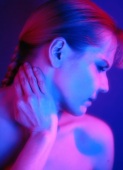- The Best Time of Day to Drink Bone Broth to Maximize Health Benefits
- 8 Ways to Increase Dopamine Naturally
- 7 Best Breads for Maintaining Stable Blood Sugar
- Gelatin vs. Collagen: Which is Best for Skin, Nails, and Joints?
- The Long-Term Effects of Daily Turmeric Supplements on Liver Health
- Could Your Grocery Store Meat Be Causing Recurring UTIs?
- Are You Making This Expensive Thermostat Error This Winter?
- Recognizing the Signs of Hypothyroidism
- 10 Strategies to Overcome Insomnia
- Could Artificial Sweeteners Be Aging the Brain Faster?
Antidepressant Eases Menopause-Related Symptoms, Study Finds


Estrogen therapy and the non-hormonal drug venlafaxine (Effexor) are nearly equally effective in reducing menopause-related hot flashes and night sweats, according to a new study.
“Our new findings provide critical data for physicians and women making treatment decisions for hot flashes/night sweats. Our data show that first-line hormonal and non-hormonal pharmacological treatments are well-tolerated and effective options for alleviating symptoms,” the study’s lead author Dr. Hadine Joffe, director of the Women’s Hormone and Aging Research Program at Brigham and Women’s Hospital, said in a hospital news release.
“Hot flashes and night sweats … affect up to 80 percent of women in midlife and are the primary menopause-related symptoms leading menopausal women to seek medical attention,” Joffe noted.
Estrogen therapy is considered the “gold standard” treatment for hot flashes and night sweats, but is used at the lowest possible doses due to potential risks associated with the treatment, according to the researchers. These risks include blood clots and an increased risk of certain cancers.
Venlafaxine, also known by the brand name Effexor, is more commonly prescribed to treat depression or anxiety, according to the U.S. National Library of Medicine.
The study included almost 350 women who were either entering menopause or had been through menopause. All of the women had hot flashes and night sweats. They were randomly assigned to receive either low-dose oral estrogen estradiol, low-dose venlafaxine hydrochloride extended release, or an inactive placebo.
After eight weeks, hot flashes and night sweats decreased by nearly 53 percent among women on estrogen therapy. In women taking venlafaxine, those symptoms dropped by nearly 48 percent. Almost 29 percent of those taking a placebo also had improvement in their symptoms.
Compared to the placebo, estradiol reduced the number of hot flashes or night sweats by an average of 2.3 more per day. Venlafaxine reduced the number of these symptoms by 1.8 more per day, according to the study published online May 26 in JAMA Internal Medicine.
The study, funded by the U.S. National Institutes of Health, is the first to compare estrogen therapy and a non-hormonal treatment, and shows that venlafaxine offers an effective alternative to hormone therapy.
More information
The U.S. Office on Women’s Health has more about menopause symptom relief and treatments.
Source: HealthDay
Copyright © 2026 HealthDay. All rights reserved.










